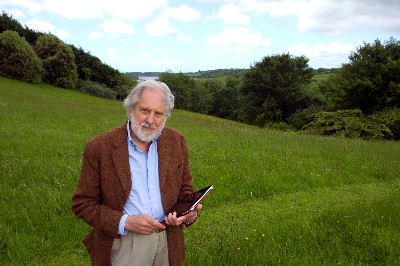Source: Emma Connolly writing in The Souther Star

‘MASS climate migration will require the world to sit up and accept climate change as a global reality.’
That’s according to Oscar-winning film producer and West Cork resident Lord David Puttnam, who predicts the mass movement of hundreds of thousands of displaced migrants, initially from Asia, in less that 20 years.
Those quick to dismiss his forecast as alarmist should be reminded of predictions he made at meeting in Skibbereen in 2001.
At that time he said that, by 2015, the Skibbereen flood will be ‘a regular thing. I don’t see anything happening to prevent it.’
Speaking at a meeting in the West Cork Hotel at that time, he also advised people to check and double-check what their insurance covered when it came to flooding.
His predictions and advice, made when he was chair of the UK’s Joint Parliamentary Committee on the Draft Climate Change Bill, proved disturbingly accurate.
Recently returned from Sri Lanka where he delivered lectures on climate change, he’s now predicting a new reality – mass migration from areas made hostile by increased global temperatures.
‘What we saw in the Mediterranean last year is a dress rehearsal compared to what I believe is on the way,’ he said.
‘Optimists suggest it will start in 2045; pessimists say it’s more likely to be before 2030 – I’m with the latter group,’ he said.
The ‘jury is out’ on how Ireland will cope with what he called an enormous ‘physical and moral issue’, with tough questions being asked of us to absorb climate refugees into this country.
‘But If I were in government, I’d have my best people looking at this right now, as we will unquestionably be asked to step up.
‘We need a clear public policy, and people in this country should be asked for their views before it becomes a crisis.’
Regarding our ability to deal with what lies ahead, he said: ‘I am pessimistic about our awareness of the problem, or our desire to address it. But I’m not pessimistic about our capacity to deal with it – it’s bridging the gap between awareness and action that’s the problem. Common sense suggests we should prepare for the worst, whilst hoping for the best.’
Our big advantage is being part of the EU, adhering to its expectations means we’ll not be left in a moral vacuum, he says.
‘We do have the science and intelligence to make a success of the future, but the best science suggests there’ll be a new global norm. But even within West Cork, communities will be impacted differently – what will happen in Ballydehob won’t necessarily be the case in Baltimore.
‘Look at Lough Hyne during Storm Ophelia which was badly hit by tree loss. Levels of vulnerability are likely to be different in each community.’
He feels community action is what will best enable mitigation when it comes to climate change – and not waiting around for the government to act.
‘It was once suggested to me that in West Cork there’s someone within 20 miles whose an expert on everything you need to know, so perhaps we should begin pooling our knowledge, we need to accept the likely realities and start coming up with solutions.’
However, he’s adamant that West Cork needs to move past complacency and be ready for a major weather ‘event’ every five years or so – a storm, increased periods of rain, or even a prolonged period of draught.
‘If I were a farmer I’d be looking at ways to ensure that, at critical times of the year, my crops are watered; I’d be considering the possibility of temperatures we’re not used to, and look at ways of both clearing and conserving water.’ Dredging the Ilen River would be a genuinely useful way to start, he believes.
The County Council will need to be ever more aware of the need for road upkeep, due to both intense rain and intense heat, and be far tougher when it comes to clearing leaves and roadside debris, and anticipating where tree vulnerabilities lie.
‘In the end we’re all interdependent – I’m reliant on my neighbours, because sooner or later I’ll cop the consequences if they don’t take action against the severity of storms and other “freak” weather conditions.’
Ultimately, regarding the future, there is only one certainty, he said.
‘It is this: the lives of our grandchildren and great grandchildren will be negatively impacted every day by climate change, be it things like food security and the way in which their homes are built and heated.
‘These will not be background issues, they will be in the forefront of their daily lives.
‘That’s the most important message to impart; that our future will not resemble our immediate past – it will be far more demanding.’







